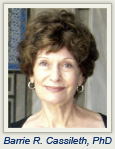Last March, nearly 250 oncology professionals and representatives of patient organizations, insurance companies, and government agencies from 12 countries attended the First International Conference on Integrative Care for the Future held in Amsterdam. Barrie R. Cassileth, PhD, chaired the event. She explained that the goals of the conference were to raise awareness of evidence-based research in complementary therapies that effectively reduce troubling side effects associated with cancer and cancer treatment, and to distinguish the legitimate practice of integrative oncology from the big business of bogus alternative cancer cure claims.
What was accomplished at the Conference on Integrative Care for the Future?
Integrative medicine for cancer is in a peculiar position in the sense that it gets attacked from both ends of the cancer care spectrum. It is criticized at times by mainstream oncology—more so in Europe than in the United States—as being quackery, which adamantly it is not. The complementary therapies that are being used and studied today in major academic centers are rational, evidence-based interventions. At the other end of the spectrum, in Europe and in other parts of the world, purveyors of bogus “treatments” have taken over the term “integrative medicine.” In Europe especially, integrative medicine and integrative oncology have become synonymous with quackery.
An important issue that emerged at this conference was the extent to which quackery is a huge problem throughout Europe and in other parts of the world. In the United States, where quackery has been prominent for many decades, it is a $40 billion-a-year business.
And that hinders the use of legitimate integrative care if patients are confused about the meaning of integrative medicine?
Absolutely. It also makes it very difficult for health-care professionals because they’re not always sure what the terms integrative medicine and integrative oncology imply. Words have meaning, and they can have a detrimental as well as clarifying impact. We fought very hard to get away from the term “alternative therapy” because there are no viable alternatives to mainstream cancer care. We have to clarify the terminology, and I am now referring to complementary therapies as “evidence-based complementary medicine.” ■

 Barrie R. Cassileth, PhD, Chief, Integrative Medicine Service at Memorial Sloan-Kettering Cancer Center (MSKCC) in New York, recently spoke with The ASCO Post about her quest to stamp out the illegitimate use of alternative medicine in cancer care and the results from her latest research.
Barrie R. Cassileth, PhD, Chief, Integrative Medicine Service at Memorial Sloan-Kettering Cancer Center (MSKCC) in New York, recently spoke with The ASCO Post about her quest to stamp out the illegitimate use of alternative medicine in cancer care and the results from her latest research.